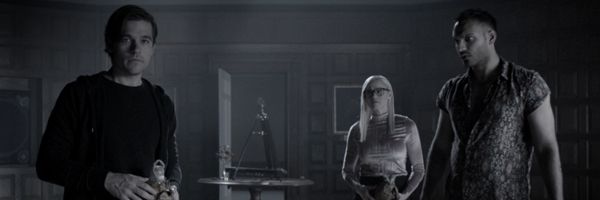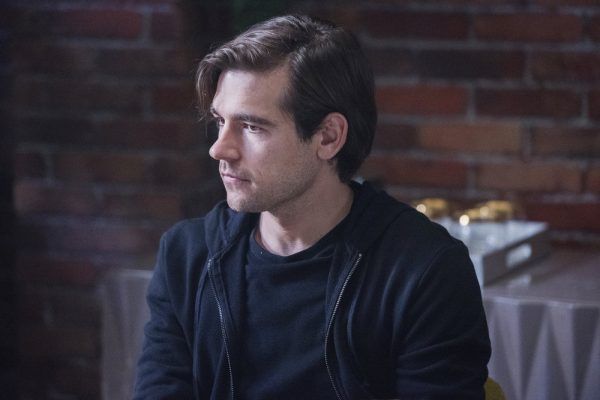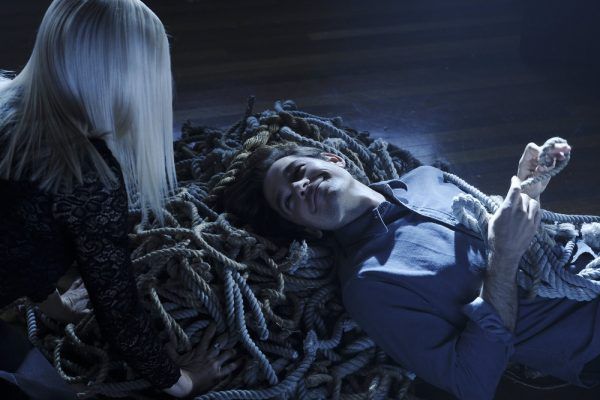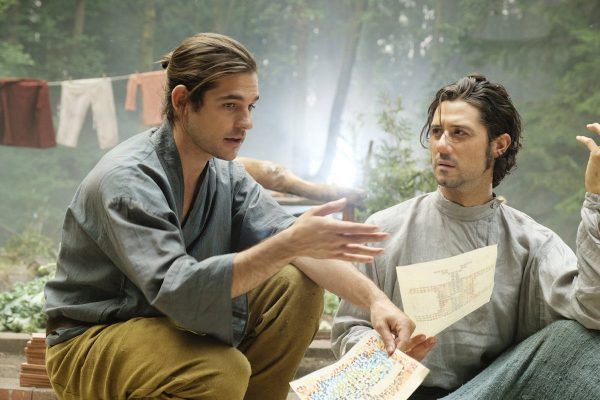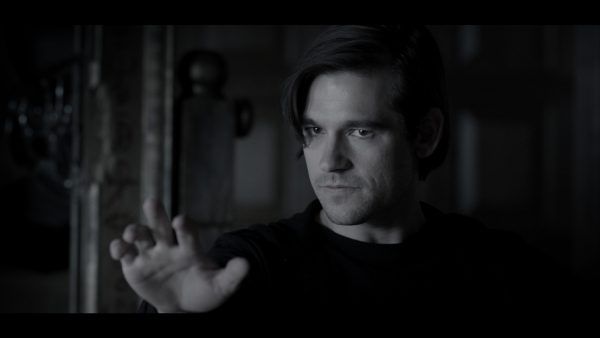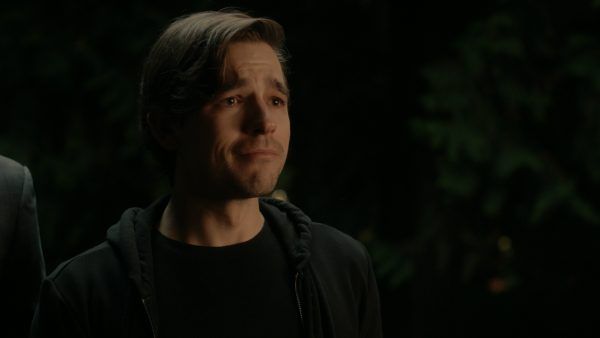Be warned there are MASSIVE SPOILERS for The Magicians Season 4 finale. If you haven't watched it, turn back now.
Seriously.
Last chance.
Ok, first thing's first. Let's all take some deep breaths and a moment to group hug this one out, and maybe break into a little mournful musical number, because holy shit. Quentin Coldwater is dead. Really dead. As in, Jason Ralph is leaving the show dead. After four seasons of extraordinary work, imbuing Quentin with pathos, charm, and layers well-beyond the trope of the handsome-but-troubled hero, Ralph said goodbye to The Magicians with a stunning sendoff in the Season 4 finale, 'No Better to Be Safe than Sorry." It's a farewell that's as beautiful as it is sorrowful, affirming the value of his life while grieving the tragedy of his passing, and signaling a new beginning for the series while honoring the past that brought us here.
Syfy already renewed The Magicians for Season 5, so if you’re worried that game-changing episode felt a bit too much like a series finale, fret not. The Magicians will return, it will just be very different from the series we knew before. We’re now living in a post-Quentin Coldwater world. So what does that mean for the show? What does The Magicians become without the boy who loved Fillory more than anyone? Whose story is it, if it's not Quentin Coldwater's?
The truth is, the series has been leading us here for a long time, both in its textual self-examination and unwavering commitment to plumbing the depths of human suffering. But The Magicians doesn't do tragedy porn, and if its track record is any indication, the series will build from the pain of Quentin's passing and make something remarkable out of it.
I never thought a series of its kind could exist until The Magicians came along; a relentlessly nerdy love-letter to the fantasy genre that embraces all the kinks and rough edges of humanity with unrelenting tenderness and freak flags held proudly high. A series that fearlessly unboxes mental health and sexuality with spectacular wit and innovative storytelling, unafraid to tread in the murky moral and emotional territory where there are no easy answers. A series with such singular, weird-ass sensibilities that will have you in stitches with lines like, "A chihuahua just demanded a blow job from an archangel, and I’m not explaining fish magicks to my bosses," before swinging for a wrenching emotional revelation.
At heart, The Magicians is a series that embraces broken and bent and slowly mending human beings of the world, the drug addicts and abuse survivors, the fuck-ups and failures and try-hards across every spectrum; people who never know what they're doing, but always find a way to do something extraordinary together anyway. And at the center of it all, since the very beginning, was Quentin; the true believer in the bunch, naive and self-important as he was self-loathing, a spectacularly flawed hero who radiated with his desire to do right... even when he was so frustrating you wanted to shake him by his lapels and force him to count his blessings.
Quentin was the figure that represented the childlike belief in all of us; the wonder, the awe, the belief in magic, the rages against injustice. And the way all of it gets tamped down and muffled out by the daily pains of growing up. When we lose Quentin, we don’t just lose a beloved character and gifted actor, we lose the show’s figurehead of innocence.
Surprising though it may be for a series that built a reputation for subverting fantasy tropes, that’s not far off from the heart-warming-meets-heart-wrenching loss-of-innocence themes tackled by the fantasy classicists over at Disney in recent years. The deep-cutting heartbreak of losing Quentin reminded me of the bittersweet endings in films like Inside Out and Toy Story 3. Saying goodbye to Q felt like watching Andy give away his toys; grieving that innocence you can never get back, all the while knowing it's the price we pay for growing up. Quentin was our Bing Bong, and it’s devastating to see that part of yourself go.
And Season 4 saw Quentin opening up and reconnecting with that sense of wonder again, while slowly, subtly tying up the loose ends of his arc. He forgave Alice and realized he still loved her — they even interacted with the past versions of themselves in 'The 4-1-1'; a touching look at the toll time takes on even the purest young love. But they found their way back to that love, back to each other by the end of the season -- I may not personally be crazy about the two of them coming back together, but I respect the symmetry it gives Q's arc.
Quentin also got his closure with Eliot (unsatisfying though it may feel to those of us who hoped to see that ground-breaking relationship further explored.) When Eliot fought through the monster's consciousness, Quentin finally learned that Eliot never rejected him; Eliot was rejecting himself, and Q's influence only made him a better person. "Know that when I'm braver it's because I learned it from you," Eliot told him. An affirmation that, at the time, we didn't realize was also a goodbye. It stings that they never got a proper farewell, but I suspect that's part of the point. Life gives and takes, and its cruelest strokes are often the moments we dream of that we never reach.
Season 4 also saw Quentin say goodbye to his father, letting go of the expectations he felt he'd never meet, and ultimately realizing that those expectations were mostly his own. He finally found out his specialty -- minor mending -- nothing so glamorous as he expected, but ultimately just what he needed. In general, Season 4 found Quentin accepting that nothing in life ever lives up to your expectations, but that doesn't mean you have to love it any less. "Being an adult doesn’t mean throwing away what you used to love,” Alice told him in the penultimate episode. It means seeing it through new eyes. That same episode, we saw Quentin work through his anger at Fillory, his greatest disappointment of all, and realize that loving the idea of something, believing in your own sense of wonder, even if the world lets you down, is enough.
That sense of wonder is what made Quentin so ideal as the audience's entry point into Fillory's world of wonders, the walking avatar of precisely the kind of fantasy diehards that would tune into a series like The Magicians in the first place. For many, Quentin was also an avatar of survival, of the daily victory over adversity, whether it be wavering mental health, personal loss, the disappointments of reality, or deadly super-wizards with six fingers on each hand. No matter what insanity life dealt him, literal or figurative, Quentin Coldwater kept fighting the good fight as best he could. Blunders, self-pity, self-loathing and all, Q wouldn't be defeated. In a gorgeous stroke from the writers, it turns out he never will be.
Quentin may have gone down in the fight against evil god monsters and a fascist librarian who would become one, but they never defeated him. He went out on his own terms, saving the day in the process, proving himself to be the brave and loyal man he always doubted himself to be. In the finale's most eviscerating scene, Quentin faces those doubts again, pondering his final moments with Penny-40 in the underworld. "Did I do something brave to save my friends? Or did I finally find a way to kill myself?" It's a dangerous, courageous question most fantasy stories would never think to, let alone dare to ask.
In a graceful touch, The Magicians gives Quentin closure. Penny-40 shows him his own funeral, where his friends gather round and offer tribute, breaking into one of those signature just-roll-with-it musical moments. They sing a surprisingly emotional a capella rendition of "Take On Me," while Quentin's copy of "To Fillory and Further," a deck of playing cards, and most painful of all, a peach, tumble into the fire -- the most precious memories of Quentin Coldwater, theirs and ours. "You didn't just save their lives, you changed their lives," Penny says. Quentin's final act wasn't one of despair, he didn't take his own life, he gave it. And for good reason. Each person's journey with mental illness is their own, and your mileage may vary on this point in particular, but to me Quentin's final farewell was a thoughtful, elegant way to reconcile the character's suicidal tendencies without letting them off the hook.
Perhaps the most crushing element of Quentin's death is the finality of it, but that's also what makes it so powerful. The finale screeners issued to the press were accompanied by a statement from Ralph and the showrunners stating in no uncertain terms that the actor was leaving the show. The post-mortem interviews are even more resolute. "This is the closing of Quentin Coldwater’s journey on The Magicians," he told EW. Which is a bold statement considering the infinite possibilities the writers have given themselves for resurrection.
In a series that has parallel dimensions, body-possessing god monsters, and plenty of timey-wimey subplots, it’s easy to imagine the countless ways they could bring Quentin back. But they've taken pains to ensure we can't delude ourselves that way. By letting us know Quentin's death is final, The Magicians delivers the harsh wallop of helplessness that comes with any real-life loss. Something you once had, something you held dear (even if it's just a fictional character you love), is gone now and there's no getting it back. You can't substitute that emotional experience with smart plotting, you have to deliver it as a clean break, brutal and unexpected. "No Better to Be Safe than Sorry" lets the audience sit with it, too. It gives us time to feel the loss. Quentin dies mid-way through the episode, allowing us the back half to reckon with our grief, to feel it wholly before some new adventure comes our way.
For me, this is one of the most devastating episodes of television of all time, right up there with iconic heart-breakers like Buffy's "The Body," Game of Thrones' "The Rains of Castamere," and Six Feet Under's extraordinary series finale. It rocked me to my core, and I'm still processing the emotional fallout. It's brutal and beautiful, shocking but sincere, and it taps into fundamental truths about the horror and beauty of mortality that most of us spend our lives running away from. But one of the hardest parts of losing someone you love is realizing the world will just carry on around you and expect you to carry on, too. The inevitability of death is matched by the promise of birth. With Season 5 on the horizon, The Magicians is poised for a new life. Not a reboot exactly, but a chance to grieve and grow, and to redefine its identity yet again.
Quentin's arc was ultimately about realizing he wasn't the center of everything, he wasn't the chosen one, but he could use his gifts -- minor mending, as it were -- to change the world anyway. Likewise, The Magicians has spent the last few seasons growing up, realizing Quentin's arc wasn't the only important one, and blossoming an extraordinary ensemble. After all, this is the series that showed Eliot, Margo, and Fen could all be High King and that no story is more valuable than the other. The writers took pains to remind us of that in this season's sharp-witted episode "The Side Effect," which deconstructed the idea of the white male protagonist and pointed to the important, often forgotten "side-characters" that help spur a story to greatness.
The series reaffirmed that theme in the finale, and not just by killing off Quentin. After all, it may have been Quentin's final act of sacrifice that sent the monster hurtling into The Seam, but that never would have been possible if Kady hadn't rallied the hedges, embracing the power of magicians from all walks of life when they cooperate. So where does The Magicians go from here? Anywhere it damn well wants. Quentin may be gone, but The Magicians still has infinite stories to tell, and those stories will continue to grow up and confront the harsh realities life as it's characters do. That means tangling with loss — real loss, not the kind that’s written out — and coming out the other side stronger.
Magic, after all, comes from pain.

